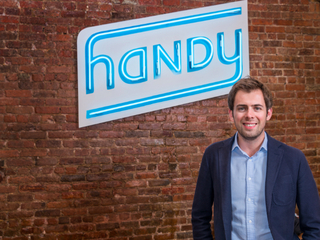How does Course Hero make money?
The company offers a freemium model, where users can pay to access more content and ask questions
Read more... Overlapping with companies like TaskRabbit and (the now defunct) Homejoy, Handy is another company in the rising gig economy, connecting people who need services with the specialists who can provide those services.
Overlapping with companies like TaskRabbit and (the now defunct) Homejoy, Handy is another company in the rising gig economy, connecting people who need services with the specialists who can provide those services.
Handy provides services for cleaning, handymen, plumbing, electrical, moving, painting, and furniture assembly across 28 cities in the U.S., Canada, and the U.K. The platform connects consumers to over 50,000 contractors and it processes over 100,000 transactions monthly. To date, the app has handled over two million bookings.
Based in New York, Handy has raised over $110 million and employs over 125 people.
As to be expected, Handy makes money by charging for services. The company gives you a quote based on the type of service requested, the number of hours needed, and the region in which you're requesting service. And each booking must be for a minimum of two hours.
In San Francisco, for example, a monthly two-hour cleaning costs $72. The customer can save money by booking more frequent visits: the same two-hour cleaning is $68 every two weeks or $64 every week.
Really, it comes down to three different hourly rates—$36, $34, and $32—depending on the frequency of the requested service.
So if I add "laundry wash & dry," Handy ups the service time to three hours and the service fee respectively: $108 for monthly, $102 for every two weeks, and $96 for weekly. Other services like cleaning for inside cabinets, inside the refigerator, inside the oven, and interior windows each add another 30 minutes of service. Also, it's important to remember that these are estimates. If the cleaner ends up spending four hours instead of two because you don't know how many bathrooms you have, you will be charged accordingly.
Handy also offers different services with varying hourly rates:
Again, these are prices for San Francisco, which typically has higher service fees than other cities where Handy operates, including New York City, Chicago, Boston, and Atlanta. Just another one of the joys of living in the city by the Bay.
Handy also charges higher rates for jobs that require workers with specific skills, like plumbers, electricians, and other handymen. Also, akin to Uber's "surge pricing," Handy has "peak pricing," which translates to higher rates when there's an increased demand for its professionals.
Of course, Handy isn't pocketing the vast majority of these service fees. Because everyone providing a service through the platform is treated as an independent contractor, Handy is essentially the middleman. So, like many similar services in the gig economy, Handy takes a small cut of the customer's payment before passing on the rest to the worker. Handy calls this the "booking fee," and doesn't share anywhere on its site (as far as I could tell) whether this is a flat fee or a percentage rate.
I reached out to the company to determine how the booking fee is calculated, but didn't receive much help:
"We take a marginal platform fee and don't provide further details beyond that. Our goal is to make sure our pros are making the most money possible, while also ensuring our customers get the low prices they are accustomed to from Handy."
Handy does say that customers can leave cashless tips through the app (as with Lyft, not Uber), and these tips aren't subject to Handy fees.
Finally, though I doubt Handy rests its business model on this, it's worth pointing out that the company also collects various penalty fees "to enforce platform standards." Both service professionals and customers are liable to pay penalties if they reschedule without enough notice. Additionally, service professionals pay a penalty if they fail to complete a job or fail to appear.
The company offers a freemium model, where users can pay to access more content and ask questions
Read more...The company sells a premium version of its free product to parents, schools and districts
Read more...Initially a platform for renting textbooks, it now makes 90% of revenue from software subscriptiions
Read more...


